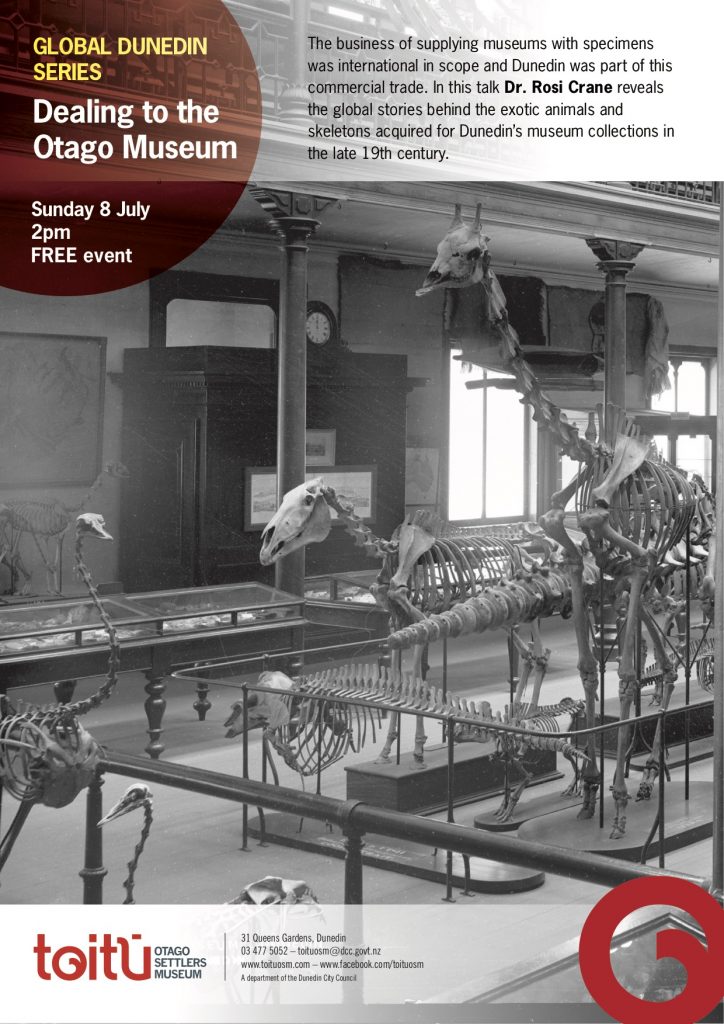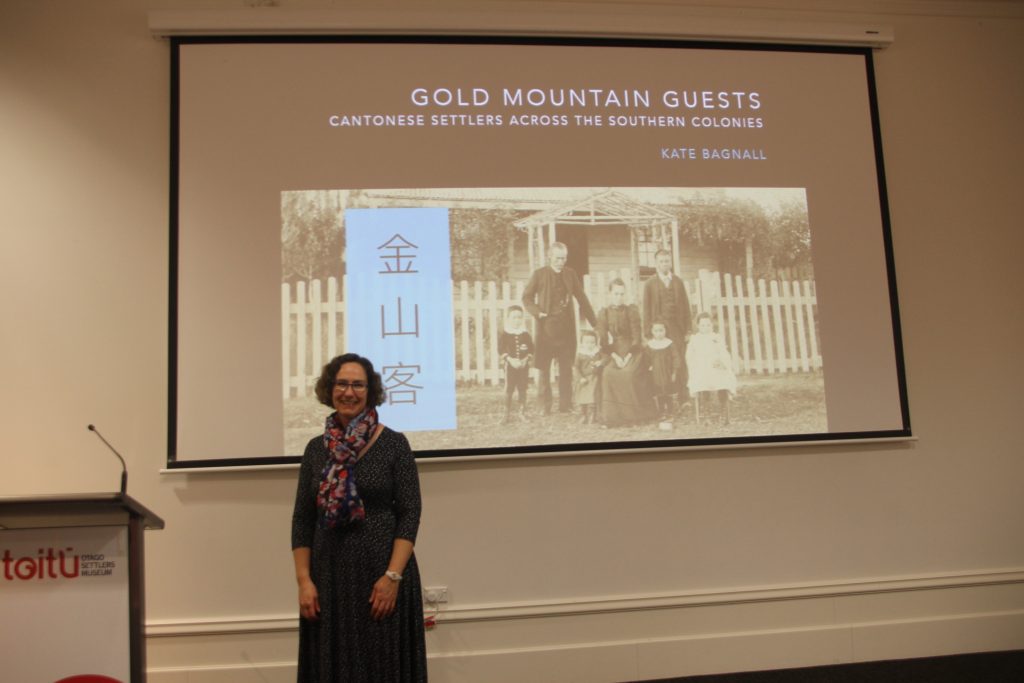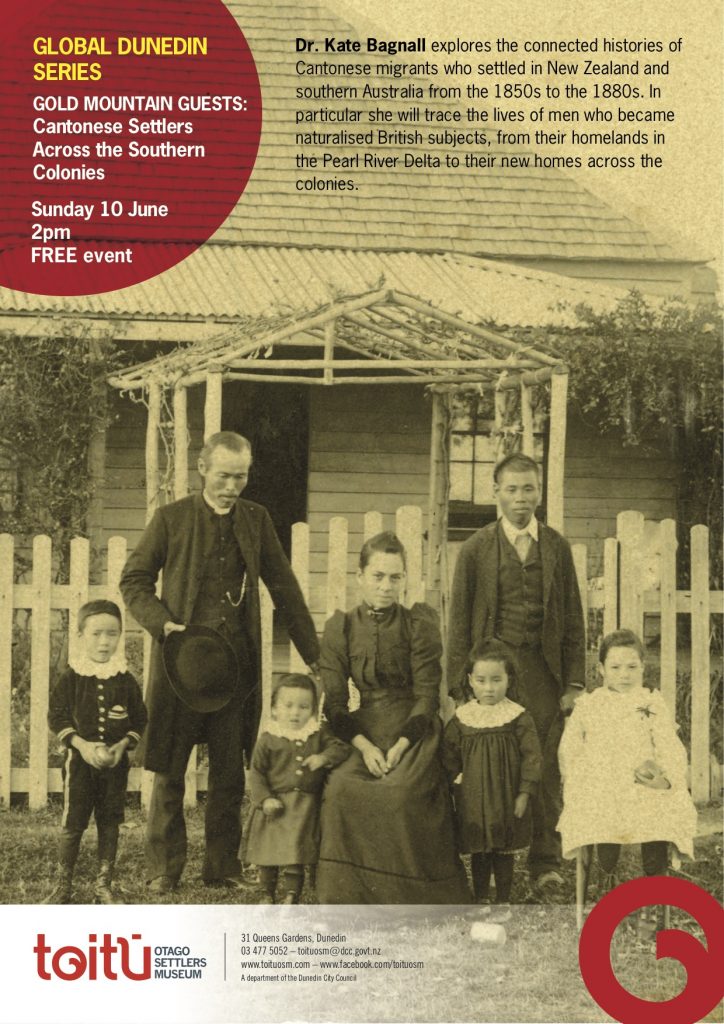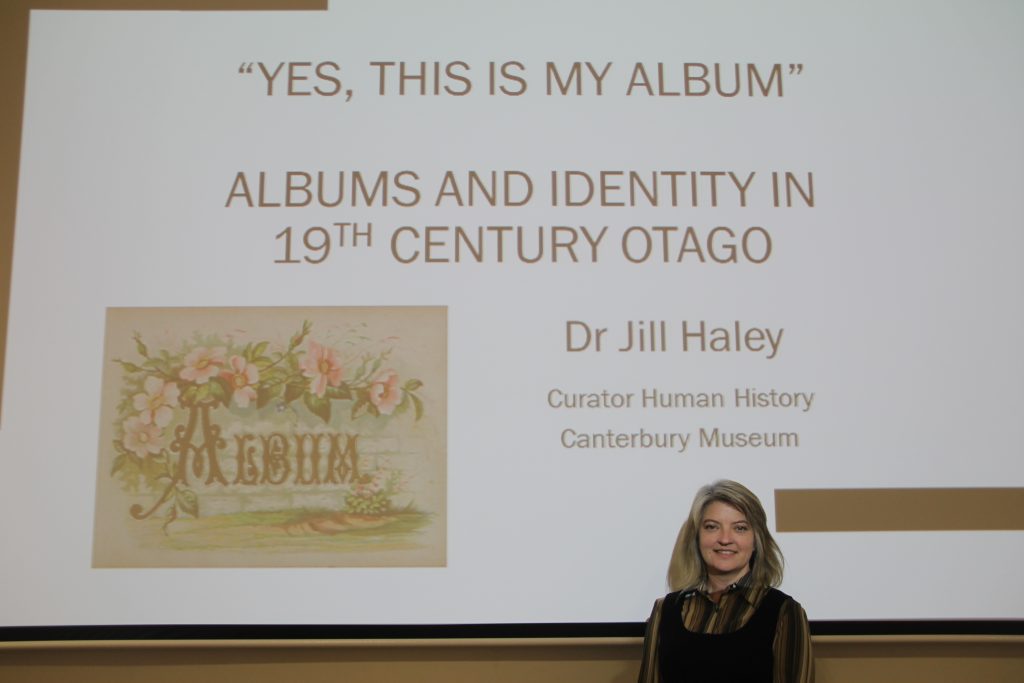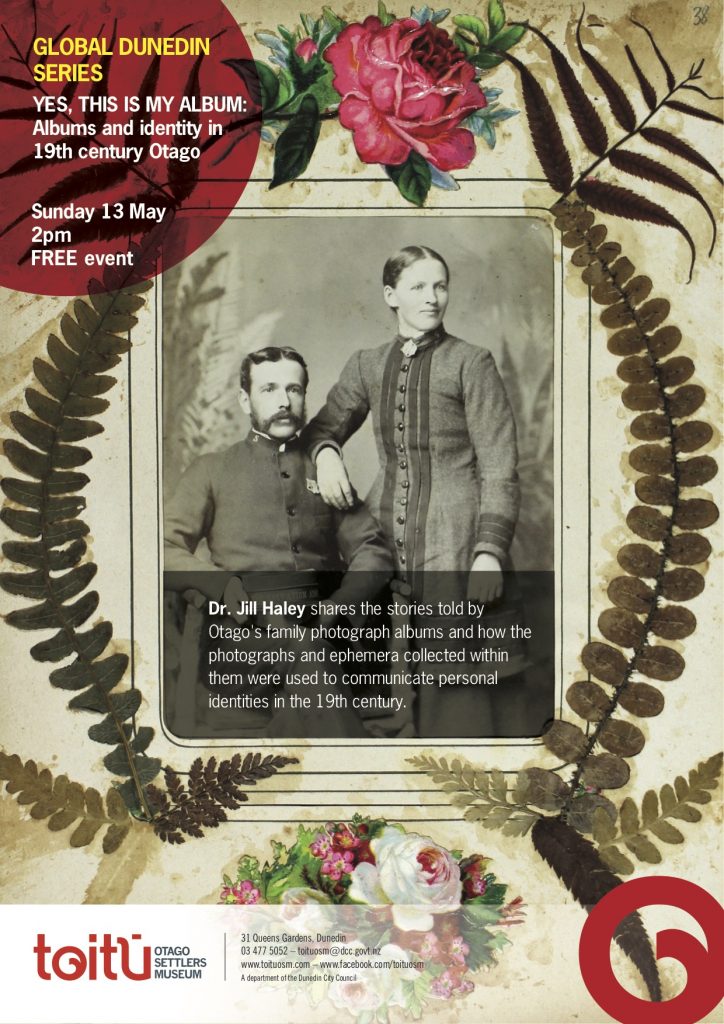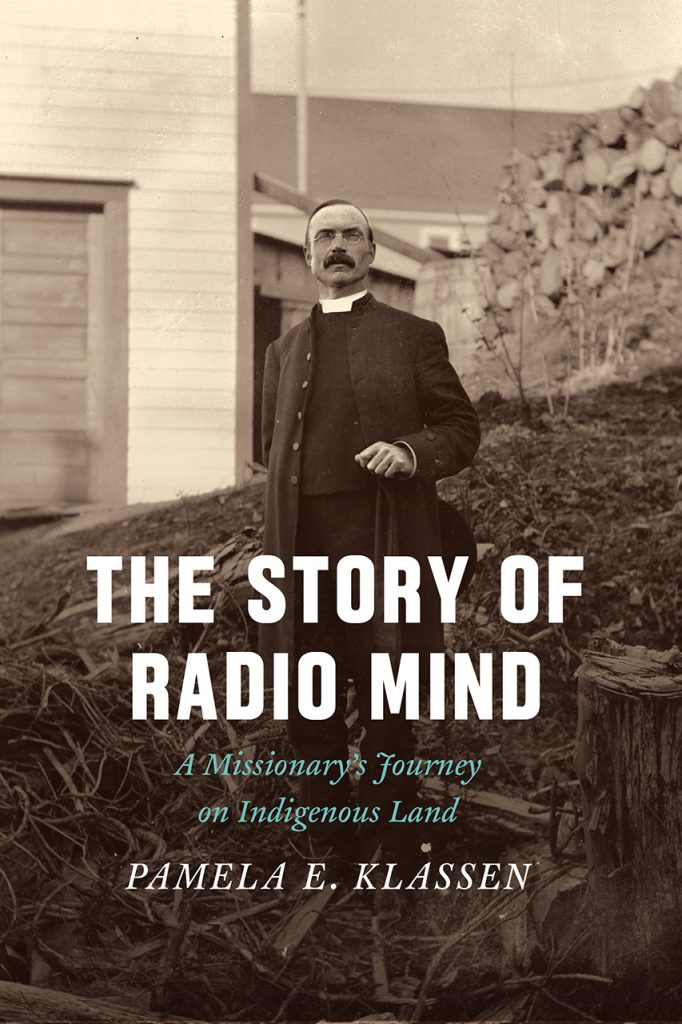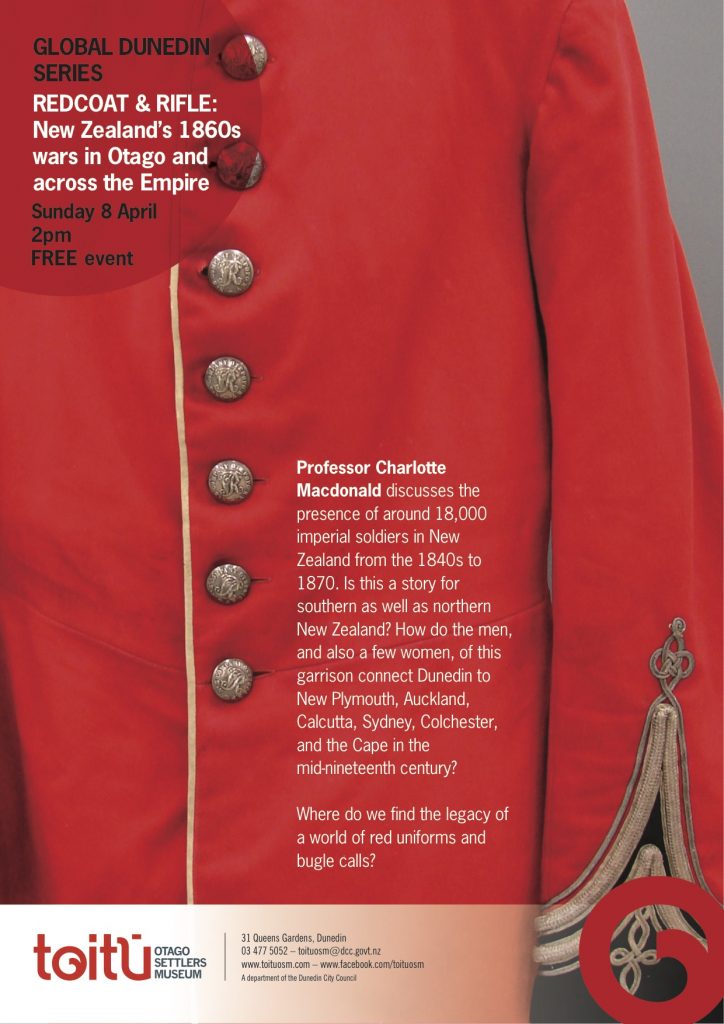Global Dunedin: The International Trade in Museum Specimens
A reminder that our next Global Dunedin lecture will be given by Dr. Rosi Crane on July 8. Her topic is the international trade in museum specimens during the nineteenth century.
When the Otago University Museum opened in its new building on Great King Street in 1877, amongst other things there was a giraffe skeleton, a stuffed lion, several monkeys, and innumerable birds from Australia, Europe, India and New Zealand. From the outset the collections were international. Many of the exotic animals came to Dunedin from commercial dealers from London, Sydney, Bremen and Prague. Some of the purchase money came from limited museum funds but most came from trading moa bones. Kiwi and kakapo skins had their value too but they were not as valuable as moa. A few scraps of correspondence has survived which tells us the price that these animals fetched, what else the dealers had to offer and what the curators wanted to fill perceived gaps. The business of supplying museums with specimens was extensive and Dunedin was part of this global network of supply and demand. The story of how historical commercial trade practices have impacted on the Museum is told here for the first time.
Global Dunedin Series
In June, the Centre was delighted to host one of our favourite historians, Dr. Kate Bagnall, who was visiting Dunedin to conduct research at local archives for her current project tracing Chinese naturalisation across the British colonies. Kate also kindly presented on an aspect of this research in our Global Dunedin speaker series. In her talk she traced the legal and personal histories of naturalisation, connecting the Dunedin experience into a larger Australasian setting, arguing that tracing naturalisation processes and records helps to uncover different histories of migration and mobility from the standard narrative of single male sojourners. This is particularly important research because Chinese presence in the British colonies is often told through a focus on exclusion and immigration restriction. Incredibly, Kate also presented fresh research barely hours old from her visit to the Dunedin archives, revealing that there were 450 Chinese who naturalised in New Zealand prior to 1908, with 197 of those in Otago. The first in Otago was Louis Gay Tan in 1870. We thank Kate for a wonderful lecture and wish her all the best for the research project.
Our next Global Dunedin lecture will be given by Dr. Rosi Crane on July 8 on the international trade in museum specimens during the nineteenth century. When the Otago University Museum opened in its new building on Great King Street in 1877, amongst other things there was a giraffe skeleton, a stuffed lion, several monkeys, and innumerable birds from Australia, Europe, India and New Zealand. From the outset the collections were international. Many of the exotic animals came to Dunedin from commercial dealers from London, Sydney, Bremen and Prague. Some of the purchase money came from limited museum funds but most came from trading moa bones. Kiwi and kakapo skins had their value too but they were not as valuable as moa. A few scraps of correspondence has survived which tells us the price that these animals fetched, what else the dealers had to offer and what the curators wanted to fill perceived gaps. The business of supplying museums with specimens was extensive and Dunedin was part of this global network of supply and demand. The story of how historical commercial trade practices have impacted on the Museum is told here for the first time.
CFP: Translation and Transculturation in, through, and by Print
The University of Otago’s Centre for the Book has announced a Call for Papers for its seventh annual research symposium, which will be held on 1-2 November on the theme “Translation and Transculturation in, through, and by Print”. The keynote speaker is CRoCC member Associate Professor Lachy Paterson, an expert on Māori newspapers and transculturation.
Call for Papers: Translation and Transculturation in, through, and by Print
1-2 November 2018
Relevant topics might include, but are not limited to:
• The impact of print in NZ in languages other than English
• The impact of print in scripts other than the Roman alphabet
• Collectors and collecting across cultures
• How books travel from one language to another
• Whether transculturation is separable from translation, i.e. can ideas travel irrespective of language?
• The extent to which print communicates across cultures more or less effectively than other media
• The effects of national language policies on the power of translation
• Any aspect of technologies for cross-cultural printing and/or translating
• The extent to which print records or distorts cross-cultural encounters
• Motivations for translation (evangelisation, education, propaganda, support)
• Whether translation inhibits or facilitates transculturation
All of these topics are of potential interest for the Centre for the Book symposium. Please email a 250-300 word abstract to books@otago.ac.nz. Abstracts must be received by 1 September 2018.
If you have any questions, please contact Dr. Donald Kerr (donald.kerr@otago.ac.nz) or Dr. Shef Rogers (shef.rogers@otago.ac.nz).
Kate Bagnall to give Global Dunedin Lecture
We’re really delighted to be hosting Kate Bagnall (University of Wollongong) for our next Global Dunedin Lecture at Toitū on Sunday 10 June. Kate is currently researching the stories of Chinese migrants who sought citizenship in Canada, Australia and New Zealand between 1860 and 1920. As she notes, the history of Chinese naturalisation in British settler colonies of the Pacific Rim is hidden, mostly because it has been seen through the lens of Chinese exclusion, a history of when it was prohibited by law rather than of when it was allowed. In this project, Kate is exploring the lives of naturalised Chinese, intertwining biographies and case studies with historical analysis of naturalisation law and policy, linking lives with legislation. Her aim is to understand why and in what circumstances Chinese migrants became British subjects, and what it meant for them.
Kate will discuss aspects of this research project at her Global Dunedin Lecture “Gold Mountain Guests”. This is a free event and open to the public. Hope to see you there!
Held in Trust: Curiosity in Things Conference
Call for Papers
HELD IN TRUST: CURIOSITY IN THINGS
A conference co-sponsored by Otago Museum and the Centre for Research on Colonial Culture, University of Otago
24-25 January 2019
Barclay Theatre, Otago Museum
The history of museums has largely been framed under the rubric of colonial domination or building cathedrals of science. But what are the bigger stories that motivated the creation of the collections?
Objects have the capacity to tell stories of lives and communities that are interconnected over space and time. Objects are the tangible material world of scientific endeavour and during the nineteenth century trade in them boomed, yet accounts of the political context surrounding their discovery and translocation are overlooked.
Looking beyond object biographies, tales of eccentric collectors, acquisition and institutional histories, this conference foregrounds the global context of commercial trade and exchange networks that contributed to the patterns of knowledge discovery and creation. What then are the bigger stories of culture, economics and politics that formed our colonial museums?
We invite contributions that address the broad theme of knowledge production in the colonial museum.
Keynote speakers:
- Professor Tony Ballantyne FRSNZ Co-director Centre for Research on Colonial Culture and Pro-Vice Chancellor Humanities, University of Otago.
- Professor Simon Ville, Senior Professor of Economic and Business History, School of Humanities and Social Inquiry in the Faculty of Law, Humanities and Arts, University of Woollongong.
- Associate Professor Conal McCarthy, Director of the Museum and Heritage Studies programme at Victoria University of Wellington.
Please send your abstract (max. 250 words) and one-page CV to crocc@otago.ac.nz by September 15th, 2018.
For further information, please contact Rosi Crane (Rosi.Crane@otagomuseum.nz).
Photography, Family Albums and the Making of Identity
In conjunction with Toitū Otago Settlers Museum, the Centre hosted the third lecture in the Global Dunedin Speaker Series on Sunday 13 May. Dr. Jill Haley, Curator Human History at Canterbury Museum, and a former archivist at Toitū, spoke to an attentive audience about album culture in colonial Otago and how engagement in this practice helped forge personal identity. In a richly illustrated talk, Jill discussed some the findings from her recent doctorate titled The Colonial Family Album: photography and identity in Otago, 1848-1890 (which can be downloaded from the University of Otago’s library here), which examined over 50 albums from Toitū’s collection. Although it might be assumed that albums were used by migrants to remember family and to assert familial connections to their former homes (whether Scotland, England or Ireland), instead the majority of album makers collected and displayed photographs that asserted their connections to their new home in the Otago colony. But album makers also included photographs that illuminated the global dimensions of their personal connections, including Priscilla Scott’s, which included images relating to places she visited with family, notably Peru, Hawaii and the United States. Increasingly, album makers also purchased photographs of local and international celebrities, as well as the the British Royal Family, for their collection.
Many thanks to Jill for a fantastic and illuminating talk that provided an insight into how the global practices of photography and album culture were shaped by local conditions and utilised to narrate personal identity.
Photography and Global Dunedin
The Centre’s monthly Global Dunedin Lecture Series resumes on Sunday 13 May with a talk by Dr. Jill Haley (Canterbury Museum), who will discuss the role of colonial photography and album-making in shaping the identities of Otago’s 19th century settlers. Jill’s talk will take place at Toitū’s Auditorium, starting at 2pm. All welcome!
Visiting Scholar: Prof. Pamela Klassen
With Religious Studies the Centre is co-hosting a visiting scholar, Pamela Klassen, Professor in the Department for the Study of Religion at the University of Toronto, where she is also Vice-Dean, Undergraduate & International in the Faculty of Arts & Science. The author of many books and articles, her most recent publications are The Story of Radio Mind: A Missionary’s Journey on Indigenous Land (U of Chicago Press, 2018) and Ekklesia: Three Inquiries in Church and State (U of Chicago Press, 2018), co-authored with Paul Christopher Johnson and Winnifred Fallers Sullivan. She currently holds the Anneliese Maier Research Award from the Humboldt Foundation in support of a five-year collaborative project entitled “Religion and Public Memory in Multicultural Societies,” undertaken together with Prof. Dr. Monique Scheer of the University of Tübingen. For more information, see http://projects.chass.utoronto.ca/pklassen/
While in Dunedin Prof. Klassen will give several public talks. The first is a research seminar in the Department of History and Art History, Wednesday 11 April, 3.30pm, in Burns 5, ground floor Arts Building (95 Albany Street) on the topic “Photography, Resistance, and Re-mediation on Manidoo Ziibi”.
In this presentation, Prof. Klassen will consider the significance for studies of missionary colonialism of what scholars call the “photographic event,” focusing on a diary written by an Anglican missionary-journalist, Frederick Du Vernet, during his 1898 trip to visit the Ojibwe of Rainy River in Treaty 3 territory (also known in Canada as northwestern Ontario). Du Vernet recorded both Ojibwe resistance to and requests for his picture-taking. His stories reveal how the event of taking photographs marked his own longing to capture spiritual stories and presences and provoked a variety of Ojibwe responses to such forms of visual capture. The talk will also introduce a new visual/textual/audio remediation of the diary in the form of a digital storytelling website being developed with a team of students in consultation with the Kay-Nah-Chi-Wah-Nung Historical Centre of the Rainy River First Nations.
Two further public talks are planned:
“Frequencies for Listening: Telling Stories of Missionary Colonialism in the Wake of Canada’s Truth and Reconciliation Commission on Indian Residential Schools”, Public Lecture co-sponsored by the Centre for Research on Colonial Culture, 18 April.
“Treaty people and the spiritual vulnerability of colonial settlement”, a research presentation hosted by the Department of Theology and Religion, 20 April.
Further details about these events will be advertised in the near future.
Redcoat and Rifle
On Sunday 8 April the Centre is hosting a Global Dunedin Lecture at Toitū’s Auditorium. Our speaker is Charlotte Macdonald (Victoria University of Wellington) who will discuss her Soldiers of Empire project, which is tracking the histories and legacies of the 18,000 men who served with imperial regiments in New Zealand during the 1860s. In this talk Charlotte will speak about Otago’s connections to this story with an emphasis on the wider imperial context, particularly with respect to social history and material culture. This is a free lecture and all are welcome.

